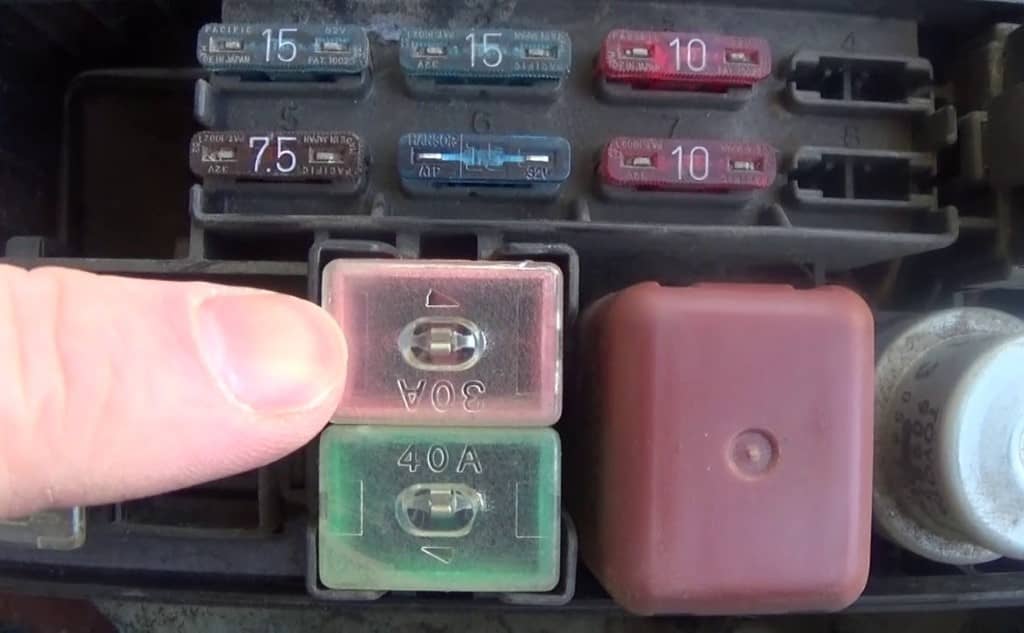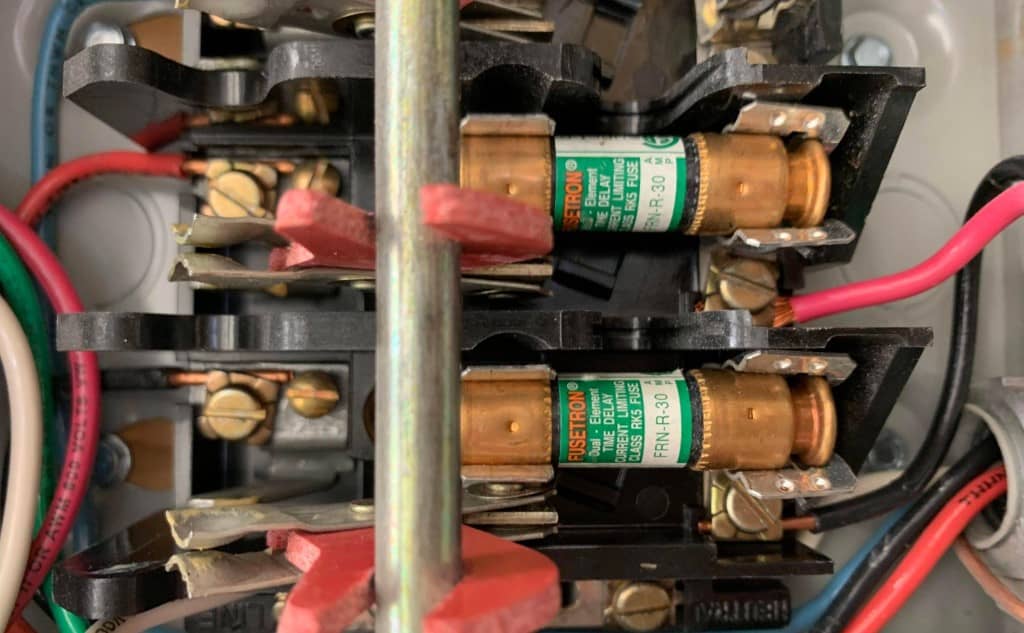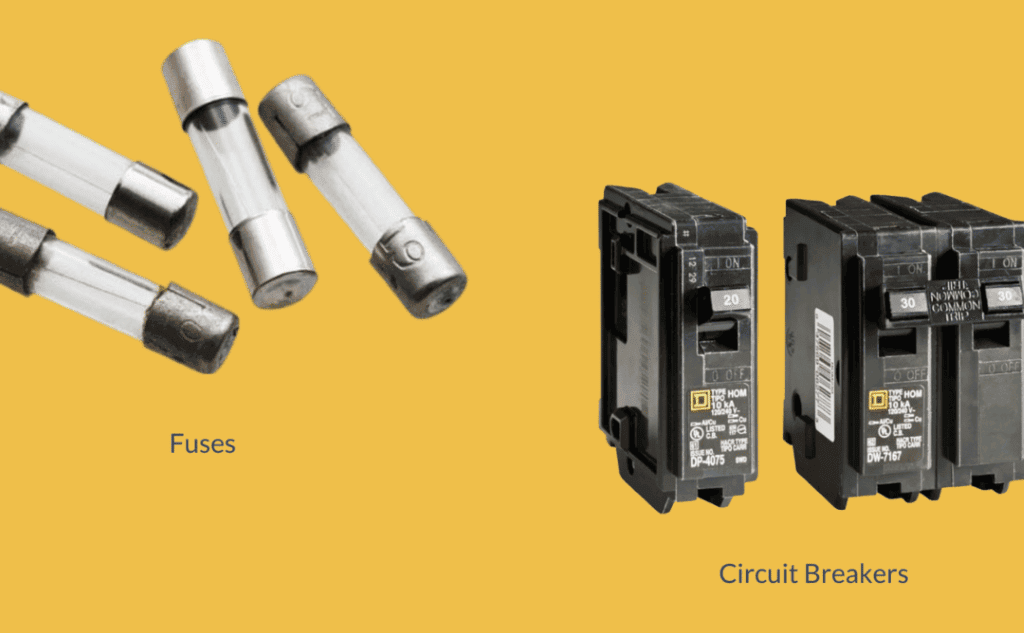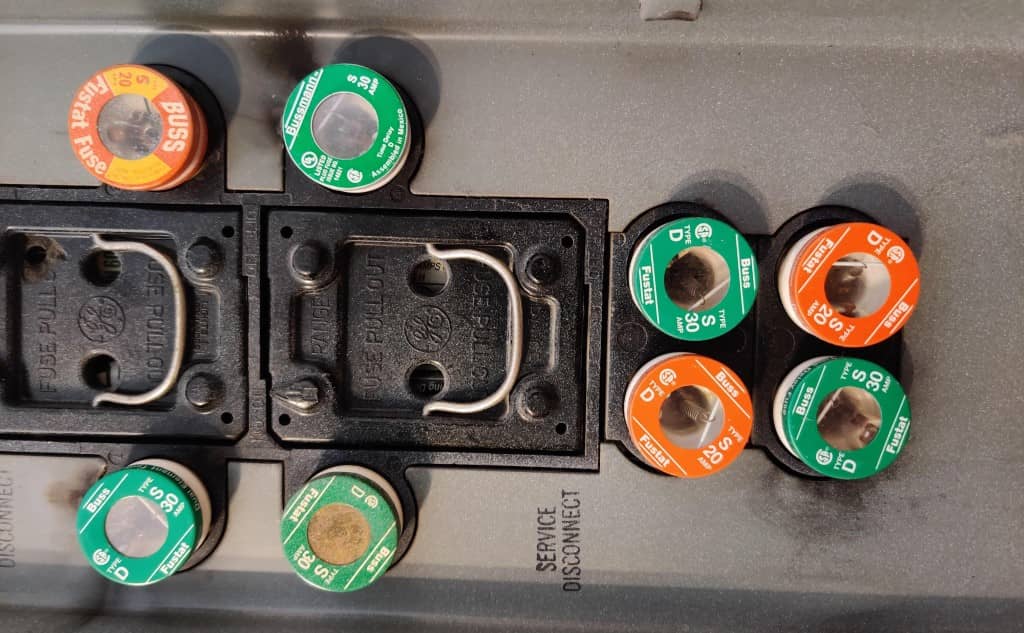When you buy through links on our site, we may earn an affiliate commission, Read More.
One Sunday afternoon while I was in my RV, my gear brakes got stuck in the park. The lights and gear would not shift whatever I did. My horns also gave out as they worked on the same wire, so I decided to check the fuse. My fuse was a 20 Amp fuse slot.
That’s when I asked myself, can you put a 30 amp fuse in a 20? You can definitely do it, but it is not safe. Research shows that around 20,000 fires are caused just because of fuses each year. Using a 30 amp fuse allows a larger current to flow. This might affect the electrical components and cause a fire.
This question is common and many people do this without knowing the dangers. If you are asking yourself this question, then this article will definitely save you a hassle!
Can You Put A 30 Amp Fuse In A 20 Amp Slot?
To answer your question, yes. But you should not if you don’t want to die. Doing so can cause parts, wires, or circuit board tracks to turn out to be hot to such an extent that they can light a fire.
On the off chance that you don’t have the right fuse for a circuit, you ought to continuously utilize a breaker of lower esteem. It will blow on a more regular basis, yet it will constantly blow before the greatest evaluated current of the circuit.
Thus, assuming that a circuit had a 30A fuse that blew, and expecting that the reason for the overcurrent is known and fixed and that the circuit normally attracts 18A to 25A, the wire will function as long as the ongoing stays under 20A. Nothing in the circuit will be harmed.
No products found.
What Is A 30 Amp Fuse Used For?

A solitary 30 amp fuse is usually used with transporters equipped with purchaser unit. Electric cloth dryers or forced air systems can be used with a 30-amp screw-in combine. The circuits are set up with wire.
Can I Use A 30 Amp Fuse Instead Of 20?
You should not use a 30 amp fuse instead of 20. You may blow a 20 Amp fuse if you plug a 30 Amp fuse into a 20 Amp circuit. When you replace a 20-amp fuse with a 30-amp one, you can potentially damage or cause a fire.
If you go beyond the current maximum limits of cables, those wires may get enough hot to put your house on fire. This is both unsafe and expensive. So the fuse is there to ensure that if your devices take more electricity than is safe for your cables, they will explode. No fire – lifesaver. So to answer the question, can you put a 30 fuse in a 20? is no if you don’t want to die.
What is the issue with replacing a 20-amp fuse with a 30-amp fuse?
Issues such as fire might occur if you replace 20 amp fuse with a 30. But if you were to replace the 20A fuse with a larger value fuse, say a 30 Amp fuse, the wiring and other components in the circuit may be damaged or destroyed, and a fire could start without the fuse blowing.
You create a condition in which 25 Amps flow through a circuit designed for 20. Not a good situation, as predicted damage and maybe a fire hazard, are now a possibility.
If you wish to replace the 20 amp fuse, it means you will overload it with more than 20 amps. Assuming you’ve removed the culprit device that caused the continuous draw to be unreasonably high for the fuse, you should put another 20 amp fuse in there.
So to answer your question, can I use a 30 amp fuse instead of 20? is no. If you do, the worst-case situation is that it may start a fire. If not, and your substitute propagates your error, the next time it goes wrong, the fire is almost certain.
Is it possible to use a 20 amp fuse in a 30 amp fuse box?

It is not safe to use a 20 amp fuse in a 30 amp fuse box. If you place a 20 Amp fuse in a 30 Amp circuit, it will explode in a matter of seconds. Replacing a 20-amp fuse with a 30-amp fuse is problematic because it may not blow quickly enough, causing damage to an electrical component or starting a fire.
The fuse is essential to protect the wire and is dependent on the wiring it is supplying. Lowering a fuse amperage will not protect you any more than using the legal amperage. Using a larger amp fuse for What the wire is tested for is where troubles arise.
A 30 amp fuse is used with 10 gauge copper or 8 gauge aluminum. If the amperage is reduced, the fuse may blow depending on what the circuit is supplying.
No products found.
Can I use 10 and 20 amp fuses in place of two 15 amp fuses?
The greatest and most just answer is, obviously, no. Each electrical circuit should be designed and installed to limit the maximum amount of flow that can flow. This is to avoid overheating and fire. This is done entirely by eminent scientists and skilled personnel. The National Fire Protection Association (NFPA) provides the National Electrical Code (NEC) for safety reasons.
No products found.
Is it possible to replace a 30 amp breaker with a 40 amp breaker?
It is certainly possible to replace a 30 amp breaker with a 40 amp breaker. But if you do so, you will almost certainly start a fire. By replacing the 30 Amp breaker with a 40 Amp breaker, the wiring’s power capacity is increased.
No products found.
What happens if a 20 amp fuse is replaced with a 25 amp fuse?
If you are wondering, can I put a 25 fuse in a 20?, it will blow more frequently. But it will always blow before the circuit’s maximum assessed current. Overburdening a circuit might cause it to fail and ignite a fire.
No products found.
What Happens If I Use A Higher Amp Fuse?
If you use a fuse with insufficient amperage, the fuse will not blow as planned, causing damage to the circuit and a much higher repair expense.
What happens if a lower amp fuse is used?
It will cause the circuit to abruptly short out. A fuse functions in the same way as an ongoing security valve does. If an excessive quantity of current flows through it, it will fail.
What Are The Differences Between Circuit Breakers and Fuses?

One key contrast between a fuse and an electrical switch is that a fuse is a metal component that liquefies when there is excessive flow due to overburdening. An electrical switch, on the other hand, has an inner switch that trips when there is an excess flow in the circuit due to overburden or shorts out. Read the table below to know more:
Property | Fuse | Circuit Breaker |
| Working | An electric and thermal characteristic of a conductor is concerned with the fuse. | Circuit breakers deal with electromagnetism and exchanging principal. |
| Reusable | Once | Multiple times |
| Status indication | No | Yes |
| Auxiliary contact | No | Yes |
| Switching Action | No | Yes |
| Temperature | Independent | Dependent |
| Characteristic Curve | Shifts | Does not shift |
| Protection | Protection against the overload of power | Protection against the overload of power and short circuit |
| Function | Interruption and detection | Interruption |
| Breaking capacity | Low | Higher |
| Operating time | 0.002s | 0.02 – 0.05s |
| Version | Single pole | Multiple version |
| Mode of operation | Automatic | Manual or automatic |
| Cost | Low | High |
| Response time | 0.002s | 0.02 – 0.05s |
What is fuse rating?
A fuse rating is a continuous need to blow the fuse. When a fuse blows, it disconnects electrical power from an electrical circuit.
How Can You Calculate Fuse Rating?
The fuse rating may be calculated by dividing the power consumed by the equipment by the voltage entering the machine. P (Watts) = I (Amps) V (Voltage). The melting point and explicit opposition of several metals used for fuse wire are as follows:
| Metal | Melting point (F) | Specific resistance (Micro ohm/cm) |
| Aluminium | 240 | 2.86 |
| Copper | 2000 | 1.72 |
| Lead | 624 | 21.0 |
| Silver | 1830 | 1.64 |
| Tin | 463 | 11.3 |
| Zinc | 787 | 6.1 |
Frequently Asked Questions
1. Is it possible to use a 30 amp connector on a 20 amp circuit?
It is possible to use but it is not safe.
2. Is it safe to switch a 20 amp breaker for a 30 amp breaker?
Fuses will break easily so it is not safe.
3. Can I install a higher-amperage fuse in my fuse box?
It is not safe as the electrical components will be overloaded with higher current.
4. What happens if you use a larger fuse?
If you use a fuse with insufficient amperage, the fuse will not function as planned.
5. Is it possible to replace a 20 amp breaker with a 25 amp breaker?
It is possible to do so, but it is not safe.
Final Verdict
If you have asked yourself the question, can you put a 30 amp fuse in a 20? you might have done yourself a favor. Through this article, you now know that this is not just dangerous, but also life-threatening. Yes, you can put a 30 amp fuse in a 20, but it definitely is not wise.
Although doing this might solve the problems you are facing, it is definitely not the solution. Many people still do it without knowing the consequences. Now that you know not to put a 30 amp fuse in place of a 20, get your issue directly from a professional. Good luck!


